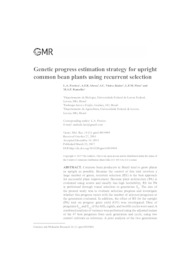Genetic progress estimation strategy for upright common bean plants using recurrent selection.
Genetic progress estimation strategy for upright common bean plants using recurrent selection.
Author(s): PEREIRA, L. A.; ABREU, A. F. B.; VIEIRA JÚNIOR, I. C.; PIRES, L. P. M.; RAMALHO, M. A. P.
Summary: Common bean producers in Brazil tend to grow plants as upright as possible. Because the control of this trait involves a large number of genes, recurrent selection (RS) is the best approach for successful plant improvement. Because plant architecture (PA) is evaluated using scores and usually has high heritability, RS for PA is performed through visual selection in generation S0. The aim of the present study was to evaluate selection progress and investigate whether this progress varies with the number of selected progenies or the generation evaluated. In addition, the effect of RS for the upright (PA) trait on progeny grain yield (GY) was investigated. Data of progenies S0:3 and S0:4 of the fifth, eighth, and twelfth cycles were used. A combined analysis of variance was performed using the adjusted means of the 47 best progenies from each generation and cycle, using two control cultivars as reference. A joint analysis of the two generations used during the evaluation of progenies for the different cycles was also performed. The genetic progress (GP) was estimated by fitting a linear regression equation to the relationship between the adjusted mean of each cycle and the number of cycles. We found that RS was efficient and the estimated GP of the evaluated progenies was 4.5%. Based on the GY heritability estimates, in more advanced generation selection for GY can be successfully performed on progenies. Thus, the selection already done for PA in F2 could be associated to the most productive progenies.
Publication year: 2017
Types of publication: Journal article
Unit: Embrapa Rice & Beans
Observation
Some of Embrapa's publications are published as ePub files. To read them, use or download one of the following free software options to your computer or mobile device. Android: Google Play Books; IOS: iBooks; Windows and Linux: Calibre.
Access other publications
Access the Agricultural Research Database (BDPA) to consult Embrapa's full library collection and records.
Visit Embrapa Bookstore to purchase books and other publications sold by Embrapa.

